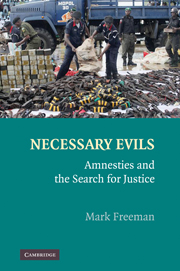Book contents
- Frontmatter
- Contents
- Preface
- Acknowledgments
- Abbreviations and Legal Terms
- Opening Considerations: On the Perennial Relevance of Amnesties
- Part I The Debate on Amnesties
- Part II The Design of Amnesties
- Final Considerations: On the Perennial Contestation of Amnesties
- Appendix 1 Summary Guidelines for Effective Amnesty Design
- Appendix 2 Selected Excerpts from International Legal Instruments
- Appendix 3 Selected Excerpts from Jurisprudence on Amnesties
- Notes
- Index
Final Considerations: On the Perennial Contestation of Amnesties
Published online by Cambridge University Press: 04 May 2010
- Frontmatter
- Contents
- Preface
- Acknowledgments
- Abbreviations and Legal Terms
- Opening Considerations: On the Perennial Relevance of Amnesties
- Part I The Debate on Amnesties
- Part II The Design of Amnesties
- Final Considerations: On the Perennial Contestation of Amnesties
- Appendix 1 Summary Guidelines for Effective Amnesty Design
- Appendix 2 Selected Excerpts from International Legal Instruments
- Appendix 3 Selected Excerpts from Jurisprudence on Amnesties
- Notes
- Index
Summary
The focus of this book has been on the broad legal and policy debates about amnesties as a tool of transition, and on the effective design of amnesties to limit the damage to justice options and to maximize accountability.
In the book's Opening Considerations, we examined the many reasons why amnesty is of perpetual relevance in global affairs. There was a brief analysis of the changed context in which amnesty dilemmas unfold, including a tracing of the ideological move away from leniency and toward accountability. In addition, questions were raised concerning the wisdom and pace of this shift, and a more open and interdisciplinary debate was urged.
In Part I (The Debate on Amnesties), the term amnesty was defined and contrasted with other legal measures that also have the effect of restricting the criminal jurisdiction of national courts. This was followed by an evaluation of the issue of amnesty in the context of transitional justice and the global and local fight against impunity. Thereafter, the discussion focused on the place of amnesties within public international law, providing an analysis of amnesties and the core obligations of states regarding human rights crimes. A number of questions were posed about the popular legal view of amnesties, and several alternative understandings were put forward, such as the need to consider a balancing of the duty of punishment with the duty of prevention of violations.
- Type
- Chapter
- Information
- Necessary EvilsAmnesties and the Search for Justice, pp. 183 - 188Publisher: Cambridge University PressPrint publication year: 2009



